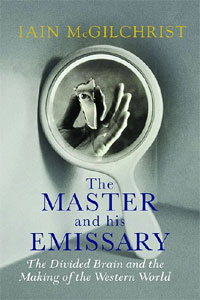The Master and His Emissary

Front cover of The Master and His Emissary
|
|
| Author | Iain McGilchrist |
|---|---|
| Country | United States and United Kingdom |
| Language | English |
| Genre | Psychology, neuroscience, philosophy of mind, sociocultural evolution |
| Publisher | Yale University Press |
|
Publication date
|
30 October 2009 |
| Media type | Print (Hardback) |
| Pages | 608 pp. |
| ISBN | (hardback edition) |
The Master and His Emissary: The Divided Brain and the Making of the Western World is a 2009 book written by Iain McGilchrist that deals with the specialist hemispheric functioning of the brain. The differing world views of the right and left brain (the "Master" and "emissary" in the title, respectively) have, according to the author, shaped Western culture since the time of the ancient Greek philosopher Plato, and the growing conflict between these views has implications for the way the modern world is changing. In part, McGilchrist's book, which is the product of twenty years of research, reviews the evidence of previous related research and theories, and based on this and cultural evidence, the author arrives at his own conclusions.
The Master and His Emissary received mostly favourable reviews upon its publication. Critics praised the book as being a landmark publication that could alter readers' perspective of how they viewed the world; A.C. Grayling, however, commented about the book that "the findings of brain science are nowhere near fine-grained enough yet to support the large psychological and cultural conclusions Iain McGilchrist draws".
The Master and His Emissary was shortlisted for the 2010 Bristol Festival of Ideas Book Prize, and was longlisted for the Royal Society 2010 Prize for Science Books.
In an interview with Frontier Psychiatrist, McGilchrist cites two main influences on his work: the psychiatrist John Cutting, and the Chicago psychologist David McNeill. McGilchrist states: "What I began to see – and it was John Cutting's work on the right hemisphere that set me thinking – was that the difference lay not in what they [the two hemispheres] do, but how they do it." In the same interview, the author explains: "Some very subtle research by David McNeill, amongst others, confirms that thought originates in the right hemisphere, is processed for expression in speech by the left hemisphere, and the meaning integrated again by the right (which alone understands the overall meaning of a complex utterance, taking everything into account)."
...
Wikipedia
